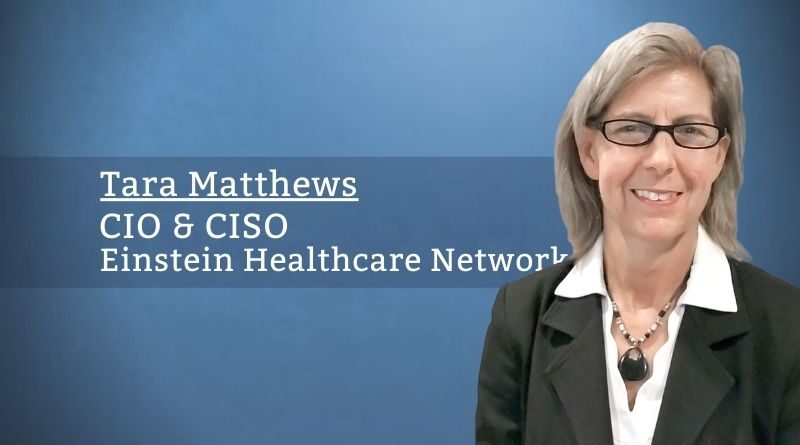Blockchain Challenges for Healthcare
By Tara Matthews, CIO & CISO, Einstein Healthcare Network
Blockchain has been around since 1991, 17 years before it was first used in bitcoin. Since inception, it’s been touted as the solution for a myriad of business cases in a wide range of industries. The applications in healthcare were hyped as endless to the point it was almost mythical. Specifically, it could eliminate siloed medical data sets, facilitate faster medical claims processing, incentivize better clinical decision-making, provide patients with access to their own medical records, eliminate the middleman from provider legitimacy checks, standardize medical data, transparentize drug supply chain and my favorite – eliminate fraud. With all these possible applications, no wonder it appeared to be a panacea to the healthcare industry.
To gain the support needed to move forward, communicating the value of a blockchain solution must be presented in business terms. This means demonstrating the ROI with a specific use case that will solve a real problem for the organization.
Blockchain is defined as a distributed, decentralized transaction ledger owned, maintained and updated by each node. It’s a peer-to-peer system with no central authority that manages the transaction flow. The transactions themselves are added sequentially and immutably to the ledger by passing through a cryptographic tool in order to keep the transaction data a secret. This framework is what drives the passion of use for a multitude of solutions.
As with any new technology, major shifts don’t ever occur overnight, but it’s been a decade and we still haven’t experienced meaningful transformations in healthcare with tangible benefits. Blockchain has benefited other industries with improved supply chains and outdated methods in terms of accountability, traceability, and transparency. However, in healthcare, we’re still at the intersection of having a ‘hammer in search of a nail’. Even most recently, I’ve heard statements and seen whitepapers with such language as: the “potential” of blockchain, finding your use case for blockchain, and blockchain “could” be the answer. The decentralized framework to enable and support is sound; healthcare just needs to go beyond the state of concept studies and theoretical implementation ideas.
Most recently, in the pharmaceutical industry, blockchain has proven to optimize the complex process of chargebacks and adds value to the business with greater connectivity for suppliers and customers. Another real, implemented solution set is with smart contracts in the insurance industry improving processing and automating claims related to flight delay insurance. Both of these proven solutions have 1 to 1 correlation to healthcare use cases, such as patient medical billing.
New ideas need open minds free from bias, stereotyping and subjective perception. The first thing that comes to most people’s minds when you say blockchain is cryptocurrency. Because bitcoin has been the most successful use case, the entire technology is perceived as negative. That’s a hard starting point and a tough one to overcome. Even if successful pilots or point-in-time solutions have been developed, because of the culture, it hasn’t moved out of the CTO seat to the Executive suite (CEO/COO) to support and fully implement throughout the business. If there’s not a level of trust in the technology, definition of the positive value it will bring, it will always remain with the technologist and be disregarded.
To gain the support needed to move forward, communicating the value of a blockchain solution must be presented in business terms. This means demonstrating the ROI with a specific use case that will solve a real problem for the organization. Capable of reducing or eliminating the costs associated with a current inefficient technology solution. Even better, targeting an area of high strategic relevance, where the blockchain solution can be transformative and increase market share. When you can deliver validated facts that align with organization’s interests, by extension the executive suite, then and only then will you gain the support and funding to fully implement and gain adoption.
Acquiring and keeping funded is always a concern and challenge for any technology solution in healthcare. As blockchain continues to move at a glacial pace, new and ‘so-called’ more glamorous solutions are on the rise with ML and AI. Reminiscence to the same hope and hype of blockchain, the solution offers tangible benefits. They have already begun proving their value in healthcare and funding has started to flow into those technologies. If you haven’t previously secured budget dollars for current blockchain solutions or haven’t proven the return on investment, it will be harder to capture additional capital or ongoing operational finances to keep moving blockchain into the future.
Lastly, there are currently no concrete or direct U.S. laws regulating blockchain technology in healthcare. Because healthcare is such a complex industry with various influential stakeholders and an enormous amount of regulation, it makes the value proposition of blockchain much more unsettling. History shows us that without standards or benchmarks, especially in technology, it’s the wild west. No standards equate to no confidence and without benchmarks, there’s no real performance measurement. Again, since blockchain hasn’t gained momentum and if the government is quiet about blockchain, less healthcare organizations are inclined to keep advancing any possible related solutions.
Considering all the obstacles and challenges, blockchain technology may not be the savior healthcare was expecting. We need to recognize and express it’s not the panacea that will solve all your business needs. However, just because it may not be necessary to use in all of healthcare, it can still be a single point solution which provides high value. This could be the catalyst for other healthcare-related enablement’s, but it’s ultimately engagement that will shape blockchains’ future for healthcare.



